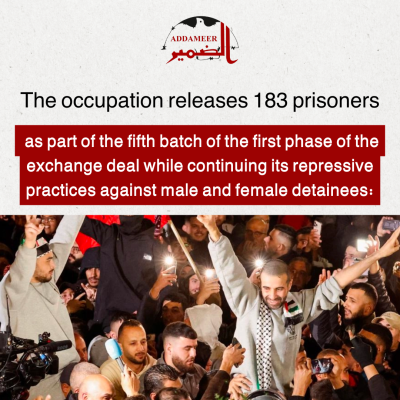
As part of the implementation of the first phase of the prisoner exchange deal, the occupation authorities released 183 Palestinian prisoners on Saturday, February 8, 2025. This batch included 18 prisoners sentenced to life imprisonment, 54 prisoners with high sentences, and 111 prisoners from Gaza who were arrested after October 7, 2023. Additionally, seven prisoners sentenced to life imprisonment were forcefully deported to Egypt as an initial stop before being transferred to other countries. This release comes amid the continued implementation of the exchange deal, while prisoners endure harsh conditions in the occupation’s prisons.
Coinciding with this release, testimonies from many freed prisoners have revealed the tragic conditions inside the occupation’s prisons. Several of them spoke about being subjected to severe beatings and humiliation up until the very last moments before their release. The toll of their prolonged suffering was visibly evident on their exhausted faces and bodies, with clear signs of abuse marking their moment of freedom.
This scene serves as a stark embodiment of the ongoing situation endured by Palestinian prisoners throughout their years of detention. It painfully reflects the extent of the violations committed against them since the first days of the genocide against the Palestinian people, shedding light on the grim reality faced by detainees inside prisons and military camps.
While the released prisoners emerged in dire health conditions, several were immediately transferred to hospitals upon their release due to the severe deterioration of their health inside the occupation’s prisons. Since the beginning of the genocide, the occupation has deliberately implemented a policy of medical neglect across all prisons and military camps, leading to the widespread outbreak of skin diseases, most notably scabies, without providing any necessary medical care. The disease has rapidly spread among detainees without any health intervention.
Since the start of the genocide, 56 prisoners have died inside the occupation’s prisons due to medical neglect, torture, and abuse. Additionally, several detainees from Gaza have died inside military camps, though no details have been disclosed about their cases. This is part of the occupation’s systematic policy of enforced disappearance targeting Palestinian prisoners.
Despite the release of these prisoners, the suffering of thousands remains ongoing inside the occupation’s prisons. While some are freed, many others continue to endure harsh conditions, as arrests of Palestinians persist on a daily and escalating basis. This ongoing reality underscores the scale of violations committed by the occupation authorities against prisoners, serving as a form of collective punishment and retaliation against the Palestinian people.